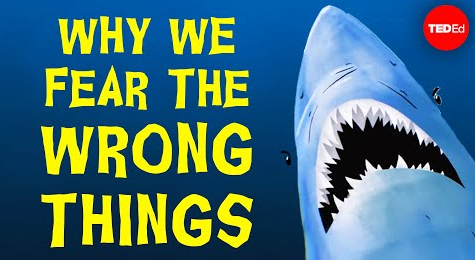A new drug reduces the risk of heart attacks by 40%.
一种新药可以降低40%患心脏病的概率。
Shark attacks are up by a factor of two.
鲨鱼袭击人类的概率翻了两倍。
Drinking a liter of soda per day doubles your chance of developing cancer.
每天喝一公升汽水会使你患癌症的概率倍增。
These are all examples of relative risk, a common way risk is presented in news articles.
这些都是相对风险的例子,也是风险通常出现在新闻报道中的方式。
Risk evaluation is a complicated tangle of statistical thinking and personal preference.
风险评估的复杂在于它混合了统计思考和个人偏好。
One common stumbling block is the difference between relative risks like these and what are called absolute risks.
使人摸不着头脑的是相对风险与绝对风险之间的区别。
Risk is the likelihood that an event will occur.
风险是指一个事件会发生的可能性。
It can be expressed as either a percentage -- for example, that heart attacks occur in 11% of men between the ages of 60 and 79
它可以用百分比来表示--比如,11%年龄在60至79岁的男性可能突发心脏病
or as a rate -- that one in two million divers along Australia's western coast will suffer a fatal shark bite each year.
风险也可用比率来表示,每年每两百万沿澳洲西岸潜水的人就会有一个遇上致命的鲨鱼袭击。
These numbers express the absolute risk of heart attacks and shark attacks in these groups.
这些数字表示的是患心脏病和鲨鱼袭击的绝对风险。
Changes in risk can be expressed in relative or absolute terms.
风险的变化既可以用相对数值也可以用绝对数值来表示。
For example, a review in 2009 found that mammography screenings reduced the number of breast cancer deaths from five women in one thousand to four.
比如,一篇2009年的报道发现乳房X光筛查,可将患乳腺癌的概率从千分之五降低至千分之四。
The absolute risk reduction was about .1%. But the relative risk reduction from 5 cases of cancer mortality to four is 20%.
绝对风险降低了大约0.1%。而癌症死亡率从5例降至4例,相对风险降低了20%。
Based on reports of this higher number, people overestimated the impact of screening.
基于对较高的数字的报道,会导致人们高估X光筛查的影响。
To see why the difference between the two ways of expressing risk matters, let's consider the hypothetical example of a drug that reduces heart attack risk by 40%.
为了说明为什么两种风险表示形式的区别很重要,让我们假设有一种药可以降低40%患心脏病的风险。
Imagine that out of a group of 1,000 people who didn't take the new drug, 10 would have heart attacks.
想象有一千多个没有服用新药的人,他们中有十个会犯心脏病。
The absolute risk is 10 out of 1,000, or 1%. If a similar group of 1,000 people did take the drug, the number of heart attacks would be six.
绝对风险就是千分之十,或百分之一。假设有类似的一千多人服用了新药,那么犯心脏病的人数就减少至6。
In other words, the drug could prevent four out of ten heart attacks -- a relative risk reduction of 40%.
换言之,这种药可以避免十分之四的人犯心脏病--相当于降低了40%的相对风险。

Meanwhile, the absolute risk only dropped from 1% to 0.6% -- but the 40% relative risk decrease sounds a lot more significant.
与此同时,绝对风险只从1%降低至0.6%--但是降低了40%的相对风险听上去效果更显著。
Surely preventing even a handful of heart attacks, or any other negative outcome, is worthwhile -- isn't it?
哪怕只能让很少的一部分人免于患上心脏病,即使药物有其他副作用,都是值得尝试的,不是吗?
Not necessarily. The problem is that choices that reduce some risks can put you in the path of others.
这也不一定。问题在于当某些风险被降低时,另一些风险会相对上升。
Suppose the heart-attack drug caused cancer in one half of 1% of patients.
假设预防心脏病的药物会导致0.5%的人得癌症。
In our group of 1,000 people, four heart attacks would be prevented by taking the drug, but there would be five new cases of cancer.
那么在我们举例的一千人中,服用此药能避免四个人犯心脏病,但却会导致五个人患癌症。
The relative reduction in heart attack risk sounds substantial and the absolute risk of cancer sounds small, but they work out to about the same number of cases.
相对下降的心脏病患病风险听上去很显著,患癌症的绝对风险听上去也很小,但它们的结果却是类似的。
In real life, everyone's individual evaluation of risk will vary depending on their personal circumstances.
在现实生活中,每个人对风险的评估都会因个人境遇而不同。
If you know you have a family history of heart disease you might be more strongly motivated to take a medication that would lower your heart-attack risk,
如果你知道自己有心脏病的家族史,那么你可能更倾向于服用能降低心脏病患病风险的药物,
even knowing it provided only a small reduction in absolute risk.
尽管你知道它只能降低很少一部分的绝对风险。
Sometimes, we have to decide between exposing ourselves to risks that aren't directly comparable.
有时,我们做出的选择会让我们面临不同风险,但是这些风险并不能相提并论。
If, for example, the heart attack drug carried a higher risk of a debilitating, but not life-threatening, side effect like migraines rather than cancer,
假如,这个预防心脏病的药物只会产生使人虚弱,或是偏头痛等副作用,并非可致命的癌症,
our evaluation of whether that risk is worth taking might change.
那我们对此药的风险评估就会产生变化。
And sometimes there isn't necessarily a correct choice: some might say even a minuscule risk of shark attack is worth avoiding,
有时,绝对正确的选择并不一定存在:有些人可能会觉得就算被鲨鱼袭击的风险极小,都应尽量避免,
because all you'd miss out on is an ocean swim, while others wouldn't even consider skipping a swim to avoid an objectively tiny risk of shark attack.
毕竟你只是错过一次在海里游泳的机会而已,但其他人就甚至不考虑因为被鲨鱼袭击的极小几率而错过游泳。
For all these reasons, risk evaluation is tricky at baseline, and reporting on risk can be misleading,
由于以上原因,风险评估通常都比较棘手,同时风险报告也会有误导作用,
especially when it shares some numbers in absolute terms and others in relative terms.
尤其使用绝对值表示一些数字,用相对值表示另一些数字时。
Understanding how these measures work will help you cut through some of the confusion and better evaluate risk.
理解风险评估的原理会帮助你理清头绪,更好的评估风险。












